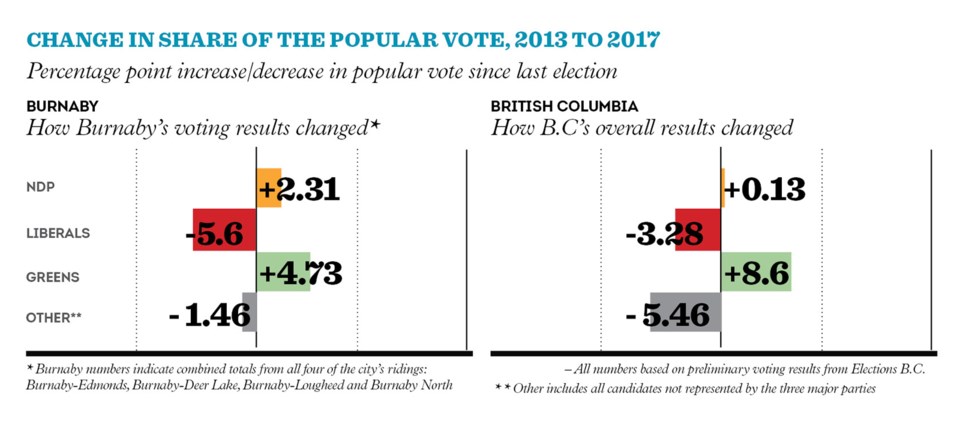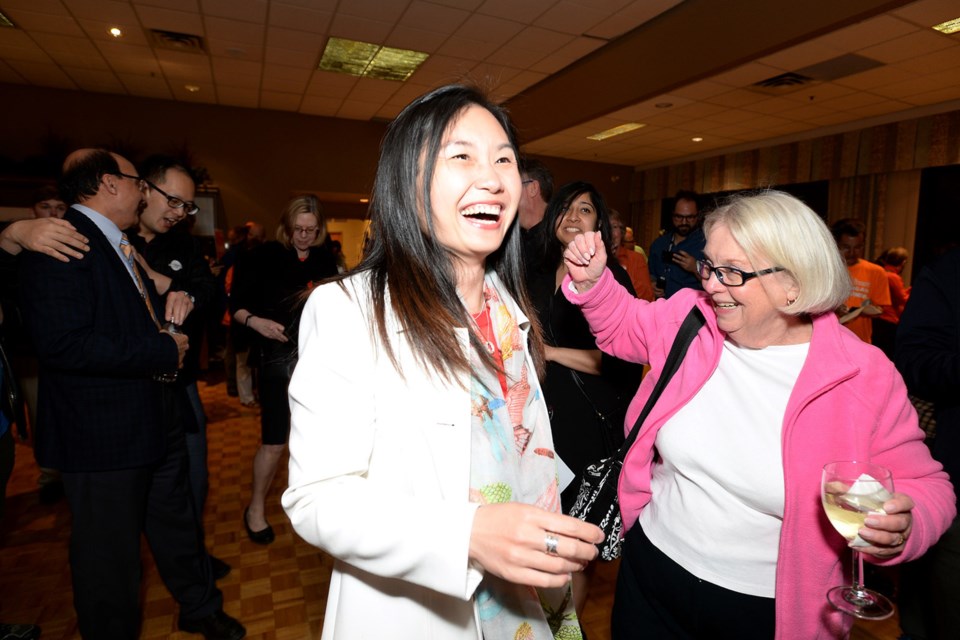It’s a refrain that voters heard repeatedly leading up to the election, not just in Burnaby but across B.C.: If you want to get rid of the B.C. Liberals, you’d better vote NDP.
New Democrat supporters pounded the pavement to get the message out that a vote for the Greens would be, in essence, a vote for Christy Clark’s Liberals.
All four Burnaby ridings were envisioned to be tight, two-way races between the NDP and the Liberals – with the Green candidates in each riding positioned to play potential “spoiler” for the NDP and pave the way for Liberal victories.
But now that election night has come and gone with a New Democrat sweep, it seems clear that the Green effect played differently than predicted.
In Burnaby, all four of the city’s B.C. Green Party candidates raised their party’s share of the popular vote over 2013: Peter Hallschmid from 7 to 11.75 per cent in Burnaby North; Valentine Wu from 8.74 to 13.61 per cent in Burnaby-Edmonds; Joe Keithley from 8.23 to 13.76 per cent in Burnaby-Lougheed and Rick McGowan from 8.39 to 11.87 per cent in Burnaby-Deer Lake. But here’s the catch: at the same time, NDP support in three of the four ridings didn’t drop. In fact, Raj Chouhan in Burnaby-Edmonds, Janet Routledge in Burnaby North and Katrina Chen in Burnaby-Lougheed saw the NDP’s share of the vote rise on Tuesday night.
“I was scratching my head half the night trying to figure out who the Greens were going to damage the most,” said Lindsay Meredith, a professor emeritus in Simon Fraser University’s Beedie School of Business and an expert in political strategy and marketing, in an interview on Wednesday morning.
Like many other pundits and election-watchers, Meredith’s initial prediction was that a Green surge would damage the NDP – which, he says, he does believe was the case on Vancouver Island.
“If the Greens hadn’t been as successful as they were, we’d probably have an NDP government today,” Meredith said.
But he said the picture becomes far more complicated outside of Vancouver Island and in ridings like Burnaby’s, with traditional NDP bases, where the Greens managed to raise their popular vote without noticeably affecting New Democrat results.
“That’s where I say we’re getting some weird new behaviours,” Meredith said. “That’s the part that’s got me shaking my head.”
In fact, he said, it seems the Green vote damaged the Liberals more – the Liberals’ share of the popular vote decreased in all four ridings.

In part, Meredith said, the Green surge comes from the fact that voters were engaging in what he calls “voter revenge games” – similar in vein to the voting that led to Brexit, to the election of Donald Trump in the U.S. and to the rise (although not the eventual election) of the far-right Marine Le Pen in France.
“It was a dissatisfaction; not voting for who you want, but voting against who you dislike,” he said.
What it boils down to, he said, is that people voted NDP because they were dissatisfied with the Liberals, and they voted Green because they were dissatisfied with the NDP.
But Meredith said many New Democrats in Burnaby’s ridings – a city with an older demographic – were among the hard-core voters who were unlikely to turn.
“Those older NDP voters tend to be very loyal animals,” he said.
Meredith said the “dissatisfied” voters who made the difference to the Greens – especially in places like Burnaby and New Westminster, with older populations – may in fact have come from the Liberal camp.
From Meredith’s perspective, the Liberals failed on one major front with older voters: health care. He said the Liberals should have paid more attention to the fact that health care was far and away the front-running concern for voters, especially those in that coveted older demographic that’s statistically more likely to vote.
Those previous Liberal voters who were angryabout the health-care issue most likely went Green instead, he said.
“I think that was purely a revenge vote,” he said.
Meredith said the NDP likely suffered some backlash on the health-care front, too, faulting Horgan’s campaign for not making it a more central issue.
“It would have been the easiest harpoon to throw,” he said.
But, he said, most of the backlash likely hurt the Liberals and benefited the Greens.
The single outlier in Burnaby was the riding of Burnaby-Deer Lake, which still went handily to Anne Kang with 47.33 per cent of the vote to Liberal challenger Karen Wang’s 36.35 per cent.
Kang was the only New Democrat whose share of the popular vote actually decreased slightly from 2013, when it sat at 48.48.
Meredith said he’s not surprised Burnaby-Deer Lake was the exception.
“Burnaby-Deer Lake is also rich as hell,” he said, noting that the well-heeled aren’t typically NDP voters. “You would have a tough job as the NDP making a good sell.”
McGowan, who challenged the riding for the Greens, sees another factor in the NDP’s outcome: the controversy over the ongoing demolition of affordable housing in Metrotown – a controversy that has dogged Kang, as a member of Burnaby city council.
“I think it was not a good idea for them to run a city councillor who was partially responsible for demovictions in the Metrotown area,” McGowan said, noting he will be curious to see the poll-by-poll breakdowns to see where the New Democrat support may have fallen. He speculates some of the drop may have come in the Maywood area, at the heart of the demoviction issue. (Poll-specific breakdowns won’t be published by Elections B.C. until mid-June.)
McGowan said the decrease in support for the NDP and the growth for the Greens makes it clear the fight over housing isn’t over.
“It’s not an endorsement to the Metrotown plan,” he said. “We plan to fight on against the Metrotown plan update.”
He said the rise of the Greens speaks to a growing “malaise” among B.C. voters with the status quo alternatives.
That part, at least, is an assessment that won’t get any argument from Meredith. The professor, in the final analysis, sees Green support coming from two camps: the true, die-hard Greens (“those who really are tree-huggers, who recycle religiously, eat kale”) and those who were part of what he sees as that “global revenge vote” – the “I just want to kick over the pot for the sake of kicking it over” voter.
The overall increase in Green popularity in B.C. – from 8.15 per cent of the vote in 2013 to 16.75 per cent this year – was, he says, the outcome of the spoiler effect.
“It turns out the Greens may be the funny magic mushroom that pops up,” he said.



